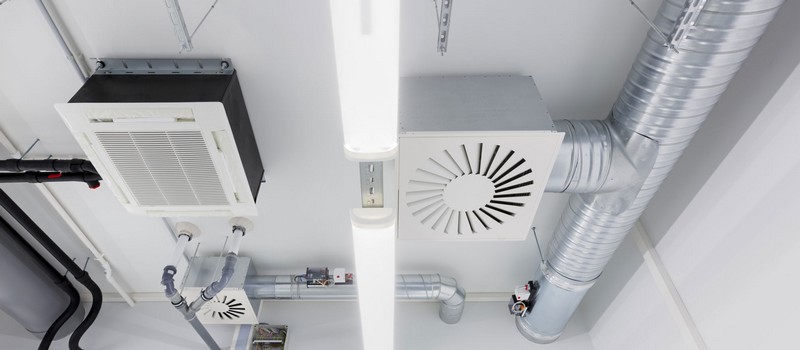Proper air conditioning maintenance is important for health and safety reasons and if you want to keep your unit functioning properly.
This guide has information for both business owners and homeowners. So let’s jump right in:
Table of contents:
- How often should air conditioning units be serviced?
- Why air conditioning maintenance is important
- What businesses & employers MUST have by law
- The different parts of an AC unit
- Troubleshooting tips for a domestic (home-based) AC unit
How often should air conditioning units be serviced?
Every 12 months, at a minimum.
That’s a very broad answer. The truth is, it depends on where and how your air conditioning systems are used. And the equivalent charge of the unit. HVAC units operate in lots of different environments. From industrial buildings to offices, to clean rooms. For a good idea of what type of air conditioning maintenance is needed — every situation needs to be looked at on its own.
The higher your unit’s equivalent charge, the more often it’ll need checking. Here are some examples:
| 5-50 tonnes | At least every 12 months. |
| 50-500 tonnes | At least every 6 months. |
| 500+ tonnes | At least every 3 months. |
In fact, if you have any HVAC unit with a C02 equivalent charge of 5 tonnes or more — you’ll need a well-detailed service and maintenance record.
Fortunately, you can arrange for air conditioning specialists to keep on top of the HVAC units on your behalf. All good specialists should offer what is called ‘planned preventative maintenance (PPM)’ contracts. A PPM contract usually involves frequent checkups and services, to keep your units in good working order. They also help to prevent breakdowns.
Unsure where your aircon unit fits into this table? Then contact us. One of our specialists will be happy to help. We offer PPM air conditioning maintenance contracts in London or the southeast — so if you’re in the area, please don’t hesitate to get in touch.
How often should air conditioning units be cleaned?
It is recommended that you should clean the internal filters around every 2-4 weeks.
How do you know if it needs maintenance?
Here are three signs that your air conditioner unit might be in need of some TLC:
- It’s noisy — if the filters are clogged then your aircon unit might make a raspy sound. Almost like it’s ‘struggling to breathe’. If it’s rattling or rumbling, then there could also be something wrong with the mechanics.
- It’s slower at doing its job — if it takes longer to cool a room, then the coolant levels may be low.
- It’s costing you more money — poorly maintained aircon units cost more money to run and don’t perform as well. You’ll notice the difference in your energy bill statements.
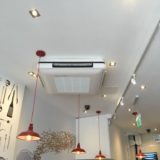
Why air conditioning maintenance is important
The most important reason is hygiene, health and safety.
If they aren’t cleaned or serviced on a regular basis, all sorts of germs can build up and colonise your units. Including one type of bacteria that eats human skin and smells like pee.
Nasty germs like this start growing after about 6 months if you leave your AC units and do nothing.
But here are some other reasons to ramp up the air conditioning maintenance frequency:
- HVAC units need to be checked for gas leaks on a regular basis. If you don’t have them checked, you could be fined under environmental law.
- If you own a business then routine air conditioning maintenance is an important component of the other types of important legal and health and safety obligations you must follow.
- Most people use HVAC units to cool down in the summer and to keep warm in the winter. Without maintenance switching from cooling to heating can result in funny smells, strange noises, leakages and error codes.
- Without service, it is estimated that for every year that goes by, your aircon unit will lose about 5% of its efficiency. Costing you more in energy bills.
Skip here if you only want to know what to do about a domestic AC unit in the home. Otherwise, business owners, feel free to keep on reading.
Aircon services that businesses and employers MUST have by law
If you are a business owner you need to think about the following if you’re wondering about the condition of your air conditioning/HVAC units:
- F-GAS compliance
- TM44 air conditioning inspections
- Up-to-date refrigerant inspections
Let’s look at them all in closer detail:
F-GAS compliance
If your business operates an air conditioning system with a C02 equivalent charge of 5 tonnes or more then you’ll need to make sure you are F-GAS compliant.
There are high demands and legal obligations for many commercial and industrial premises to be F-GAS compliant. You will be heavily fined if you aren’t. So it is very important to get this right and to make sure your units are regularly maintained and serviced by a professional.
TM44 inspections
If your aircon system has a rated output of 12kW or more then they’ll need an air conditioning service frequency assessment to check their energy efficiency every five years.
Even if you only have a few smaller-powered units on site, if they all have a combined power of more than 12kW you’ll still need a TM44 inspection. During the inspection, a professional assessor will check everything is in working order and then log in on the Non-Domestic Energy Performance Certificate (NDEPC) register.
But don’t worry. If you have a PPM contract then your aircon specialist will automatically carry out these timely inspections whenever they are required, and register them for you. So you won’t have to worry about forgetting or missing out.
Illegal refrigerant inspections
If your HVAC unit pre-dates 2004 then it could be using an illegal, outdated refrigerant gas called R-22 HCFC to keep cool.
There’s no harm to human health with R-22 HCFC. But it was found to be harmful to the ozone layer — hence the ban. It is now illegal to top-up or even to replace this type of refrigerant.
Some people may not know that their HVAC systems are still reliant on this illegal refrigerant. If that’s the case, then our experts can help you to replace or modify your existing system. So that it’ll run on the newer, more eco-friendly refrigerants.
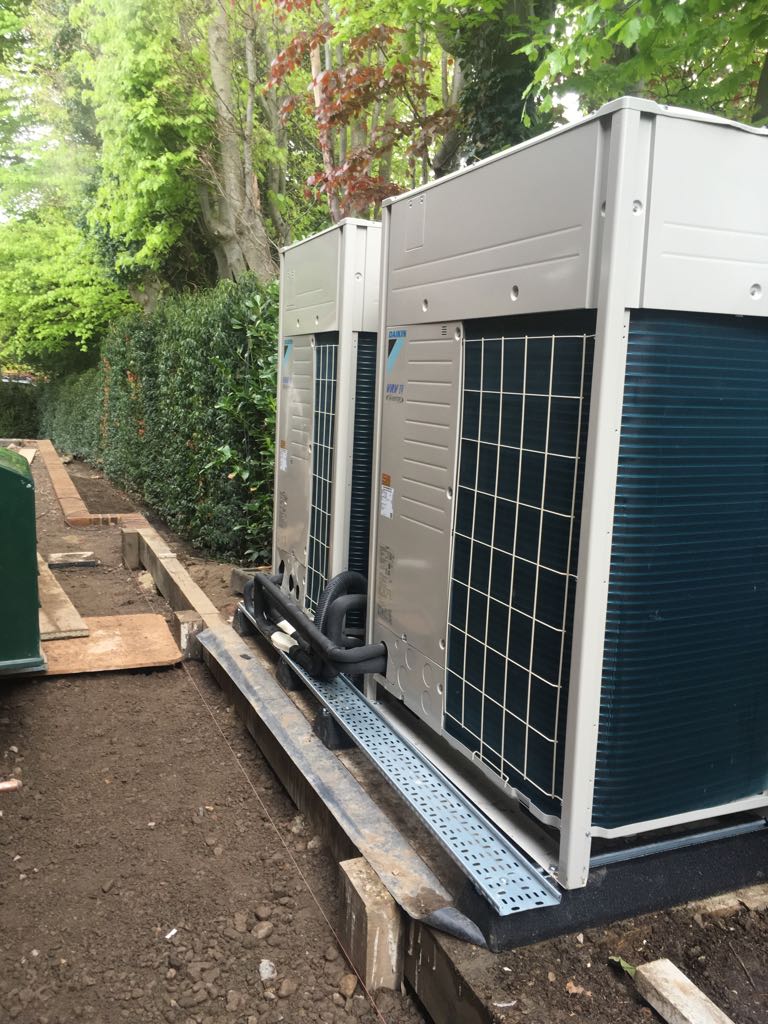
Planned Preventative Air Conditioning Maintenance Contracts
You can avoid all of the headaches and potential problems with a Planned Preventative Maintenance (PPM) contract. Having a routine PPM contract isn’t a legal requirement — but it might as well be, considering all of the other legal requirements that come with having a HVAC system in a workplace. And especially considering how often they need treatment to keep them working optimally.
If you’re based in the London/South-east area of the UK, get in touch with us. Our specialists will be delighted to help.
The different parts of an AC unit
Air conditioning units have filters, coils and fins that all need to be maintained and cleaned on a regular basis in order to function properly.
Filters
The most important part to keep clean is your air conditioning unit’s filters. Without proper maintenance, they will quickly clog up with dirt. This will soon interfere with airflow. And when airflow is obstructed, air can bypass the filter and start dirtying the evaporator coils, preventing them from absorbing heat. After that things will really start to fall apart. In fact, it is estimated that you can reduce your unit’s energy consumption by up to 15% simply by swapping out the filter for a new (clean) one.
Some types of filters can be reused (and can be cleaned by washing with water or with a vacuum cleaner) but most of them will need replacing. If you’re wondering how often should aircon filters be serviced — then the answer is once a month during the hotter months and every 1-2 months during the cooler months. And perhaps more frequently if your unit is constantly in use. Or if operating in an environment with air pollutants such as dust, allergens and/or pet hairs.
HVAC filters are often located in the air conditioner itself or nearby fixed to walls or ceilings. Some office air conditioners have a filter mounted into the grill looking into a room.
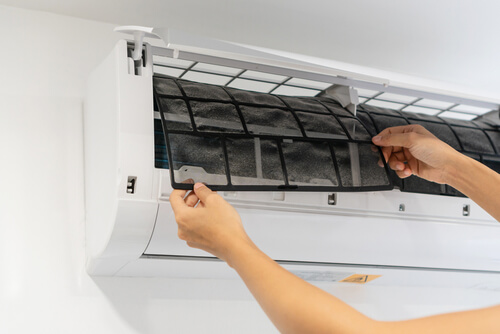
Coils
Your AC unit will have an evaporator coil and a condenser coil. Both will collect dirt as time goes on — but if you keep your filters cleaned regularly you can significantly reduce how dirty they get.
How often to service aircon unit coils? It is recommended that you check and clean your evaporator coil once a year.
As condenser coils tend to be on the outside of a unit it is easy to see when they are dirty or dusty. The best thing to do is clean whenever they look dirty. A good tip is to try and leave about 2 feet (0.6 metres) of empty space around your coils so that the air can flow freely. This includes making sure to clear away debris and vegetation and anything else such as recycling bins placed too close to the coils.
Your evaporator and condenser coils are also made up of tiny coil fins that can bend out of place over time. Air conditioning maintenance experts use a tool called a “fin comb” to unbend them and restore them to their original positioning.
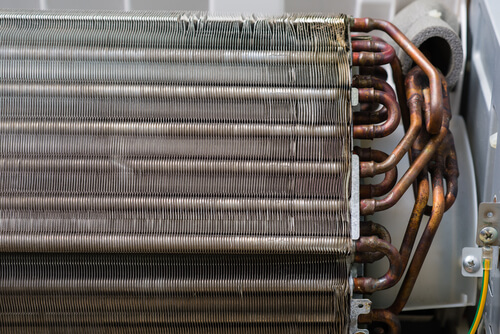
Condensate drains
Your AC unit has drain channels to reduce the humidity in the system. If these drain channels are blocked then excess water might get trapped and have nowhere else to go. This could result in water escaping from and discolouring the walls or carpet.
You can manually help to unclog the drain channels by occasionally passing a stiff wire through them.
Window seals
If you’re concerned about the efficiency of your air conditioning unit in an office or indoor workspace — then check the seals between the air conditioner and the window frame. Moisture can sometimes damage the seal, causing the unit’s metal case to pull away from the window frame. If this has happened then cold air may be escaping outside — reducing the effects of your unit’s hard work.
Troubleshooting tips for a domestic (home-based) AC unit
For all you homeowners out there, it’s still important to keep on top of your air conditioner. You’ll get more years out of it, and it won’t cost as much to run.
If you think it’s acting up, here’s a few things you can do to get to the root of the problem:
- Clean or replace the air filter — Filters quickly get clogged with dirt, dust and allergies so it’s best to check them often (every month in summer/winter, and every 1-2 months during spring/autumn time). Although if you live in the countryside with cleaner air, you might not have to check it that often.
Not all filters can be cleaned, however. Some need replacing. So check with your unit’s handbook and act accordingly.
- Inspect the wires — turn off your unit and remove the access panel. How are the wires looking? Sometimes they can burn, break or even melt. Locate the contactor switch. If it’s pitting a lot, it might be time to replace it. And check for any loose electrical connections.
(If this sounds like a bit too much for you and you live in the Greater London and south-east area, one of our air conditioning maintenance London specialists can look at this for you.)
- Check the thermostat — if you have an old-style mechanical thermostat or a programmable one it could be worth checking on that to see if it’s working.
- Inspect the condenser fan —turn the power off and examine the fan’s blades for any cracks or chips. If there’s a problem, replace the fan as soon as possible. Some of the older models might also need oiling at the motor to help them work properly.
- Check and clean the outside part — there’s always a part of the unit that’s exposed to the outside elements. Not surprisingly, this part can pick up a lot of outside dirt and debris, such as grass clippings, dead insects and leaves.
Cleaning this part is straightforward. Shut down your AC unit’s power and give it a rinse down with a garden hose. Though try not to use a powerful setting on the more delicate parts of it.
Once that’s done, check there are no physical obstructions next to the outdoor unit. Such as bins, sheds, equipment, etc. — as all this could obstruct the airflow into your system.
Never worry about air conditioning maintenance issues again — let our experts do the hard work for you
We have a variety of air conditioning Preventative Maintenance programmes to meet your company’s needs and the size of your facility — or your home if you have a domestic issue.
You will receive planned visits throughout the year as part of the air conditioning service to keep your systems effective and F-GAS compliant.
For businesses with an old air conditioning system, we can help you to manage your replacement, carry out any necessary maintenance, and to update the refrigerants in use.
Within the scope of your air conditioning maintenance contract, we will come to your business as often or as infrequently as you desire – once a month, every couple of months, or once a year. Should your air conditioning break down and require repair between regular visits, you will also benefit from our priority emergency call out service.
While we’re there, our aircon specialists will also:
✓ Check and replace refrigerant levels
✓ Test for refrigerant leaks
✓ Capture any refrigerant that must be evacuated from the system, instead of releasing it into the air (which is illegal)
✓ Check the central systems for duct leakages
✓ Measure the quality of airflow through the evaporator coil
✓ Verify the electric control sequence is correct
✓ Make sure that the heating system and cooling system cannot run at the same time
✓ Inspect electric terminals, clean and tighten connections
✓ Apply a non-conductive coating to the electrics if necessary
✓ Oil motors and check the belts for tightness and wear
✓ Check the condition and accuracy of the thermostat.
✓ So if you’re centred within our just outside of Greater London and the south-east, give us a call or get in touch.






